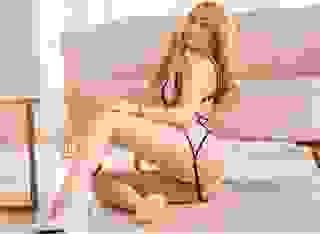- Mind Control
- The Man in the Smiling Mask
Note: You can change font size, font face, and turn on dark mode by clicking the "A" icon tab in the Story Info Box.
You can temporarily switch back to a Classic Literotica® experience during our ongoing public Beta testing. Please consider leaving feedback on issues you experience or suggest improvements.
Click hereAuthor's note: This story is set in the near-future, following a fictitious catastrophic event. However, I have chosen not to give it a "SF" tag because it lacks the basics that represent that story type. Instead, it deals with emotions and experiences that are all-too-common in our current world.
----------------
For what might be the last time in her life, Canna climbed down the two steep steps of the Number 45 bus and hurried toward the Number 27, trying her best to keep the umbrella trapped under her left arm while she juggled the impossibly large, unopened cardboard box in her small hands and arms. The area was practically deserted, which was to be expected, despite the fact that it was rush hour on a Friday afternoon. For the fourth time in three years, Louisiana's governor had issued a strict stay-at-home order for all non-essential workers.
She offered up a silent prayer that the bus she was rushing toward would wait for her, but she wasn't really observing everything properly. She tripped over a piece of broken asphalt and had to stop, setting the box down in order to retrieve the manila envelope that contained her severance paycheck and put it back under her purse. When she picked the box back up, everything threatened to slide off, but she eventually managed to balance it all. Adjusting the umbrella further into her armpit, she hoisted the box higher cursing her large breasts, which forbade her clutching it closer. Her face mask caused her dark glasses to fog, but it appeared that her bus hadn't yet moved away from its assigned spot. The late-afternoon sun was blinding, but rolling thunder portended that the blue skies might be short-lived. She reached the bus just as the squeaking, groaning hiss of the vehicle's breaks told her the driver was about to pull away; but thankfully, the door opened, and the impatient operator glared down at her from his tall throne.
Getting aboard was a chore. She had to lean way forward and slide the parcel onto the bus's floor; and then she had to pick up the envelope again, along with the purse, and the umbrella, and her dark glasses, which had somehow become entangled in one side of her paper face mask before lunging off her face entirely. The driver only scowled when she tried to fish her pass out of her purse, and he jerked a thumb aft, indicating without words that she should just hurry up and get back to a seat. The breaks gave that unique sound again, and the bus lurched into motion, throwing her sidelong into the man occupying the front seat. This was a terrible crime against social distancing, and she apologized profusely as she struggled back into the vertical, but he only nodded in curt understanding as he pulled out a small bottle of hand sanitizer.
There was a brief moment of uncomprehending panic when she noticed that the box was suddenly gone, but then she saw the retreating back of a large man walking down the swaying aisle, and her heart skipped a beat when she realized who it was. Wally. He was the reason she had waited to take the 4:45 bus from Gentilly. He was the reason she had struggled so hard to make the connection at Delgado. To see Wally. To say goodbye to Wally.
She started to hurry after him, but as she turned, she whacked the poor man in the front seat with her umbrella. In tears now, she begged forgiveness a second time, thankful that she couldn't see his features behind his mask. He nodded and said something that she couldn't understand, but she hoped (and pretended) it was kindhearted. Being as situationally aware as possible, she moved down the aisle, finding the box in front of a vacant side-facing bench seat. Her seat. She settled onto it, looking across at Wally on the opposite side of the aisle on the bench facing her. His seat.
"Thank you," she said simply. She began fumbling with her purse, cramming the envelope into it after transforming the precious check into a half-folded, half-wadded lump. Her dark glasses followed, but it was hard to zip it shut with the added contents.
"Is that really a box of Ramen noodles?" he asked, his voice the deep baritone that somehow made her knees ache. Achy knees. What an odd reaction.
She nodded without looking up from her task. "Fifty packages for ten fifty-nine," she informed him. "And free shipping. A woman I ... uh ... work with had Amazon deliver it at the office." A woman I USED to work with, she thought silently. She glanced up at him, but his image was wavering in her teary eyes. She fished a tissue out of her sweater pocket, dabbed for a moment, and looked again. Was that smile there behind his mask? That sweet, mesmerizing, gut-flipping smile? But his eyes were narrowed, his brow creased. He was worried. Worried about her. She didn't want that, truly.
How silly to feel this way! She looked around the interior of the vehicle and tried to put things into perspective. There were about twenty people on the bus, and Wally was one of only two whites. Again, that only made sense; for while the bus route did travel through white neighborhoods, during a pandemic, anyone who could possibly drive a car instead of taking a public conveyance would do so. It wasn't really a race thing; it was simple economics, risk versus available funds.
It was the inevitable definition of "essential worker," which certainly stretched across all demographics, but in the end, seemed to translate into something that was disproportionately African American. You could argue with that, of course; but try doing it to the people who lived in Louisiana's "Cancer Alley," which, during the first pandemic, was rechristened "Death Alley" as all the pollution-spewing factories between New Orleans and Baton Rouge were able to get themselves deemed "essential," and therefore became social Petri dishes. The factories didn't care about race, obviously. If they had all been white people who died, it wouldn't have made any difference to them. Workers were workers. Somebody to keep the cash rolling in.
Her socioeconomic reverie was suddenly interrupted by a moment of pure shock, for as she had looked away, toward the front of the bus, the man opposite her had suddenly moved to the vacant seat beside her. Right beside her. Almost touching her.
"Wally!" she gasped aloud, meaning it to be very loud, very demanding, but it only came out as an enthralled whisper. She had not been this close to another human being in many months.
"Canna, what's wrong?" he asked imploringly.
You're too close! she almost said. I can feel your arm against my elbow! But, of course, that's not what he had meant. He was worried that she had been crying. He was concerned about her ... more concerned for her emotionally than he was concerned about social distancing. Stupid dolt! Big, stupid, handsome, tender-hearted dolt! Even sitting, he was a head taller than she was, and as she peered up at him, she had the strangest thought. He's not smiling, she realized. But, if I had a pen, I could draw that smile on his mask. It's a little, short, lopsided smile that makes his lips curl slightly to the left.
"Canna?"
"My mother died," she said foolishly.
"Oh, Canna. I'm so sorry."
Stupid stupid stupid! "No," she muttered. "I mean ... that's not what I meant to say." She took a deep breath, feeling the face mask suck in slightly as she inhaled. "I mean, she died four months ago. That's not why I'm ... I mean, I really wanted to tell you that ..." That and you're sitting too close! (Why couldn't she say that?)
"Was it the new virus?" he asked tenderly.
"Yes." She said it automatically, without thinking at all. He asked, she answered. Simple. Automatic.
Why did everyone call it that? The first pandemic had a name, and everyone called it by that name. But this one was simply the "new virus." It had been so insidious! Just as the first one was finally, finally, being contained, or at least partially contained (with this vaccine being forty percent effective and that one being forty-five percent effective), there had been a new outbreak.
At first, it seemed so obvious to everyone that the original virus had changed somehow, had mutated or expanded (or whatever it was that viruses did). And by the time the Centers for Disease Control had figured out that it was an entirely new airborne strain, it had been too late. They couldn't even blame it on another country with this one, which had been so politically expedient the first time. Instead of bats and pangolins in Wuhan, it had been armadillos and starlings around Dallas, and it had an unheard-of incubation period of almost four weeks! By the time they knew it even existed, it had gone international, since the early symptoms were nothing at all like the first one.
A nation that was numb with economic rollercoaster swings simply saw its economy collapse into a full-blown depression. This was the apocalypse, only everyone just struggled on, because there was nothing else to do. An apocalypse with the buses still running.
Other countries fared a little better; but this one, the only large country without a federal healthcare system, was dragged into an economic abyss. This was a nation of more than 6,000 separate, independent, private hospitals, funded by more than 900 separate, independent, private insurance companies, with a combined spending of almost four trillion dollars a year (BEFORE the pandemics). Some patients were being charged a million bucks for a two- or three-month hospital stay; and no one could possibly pay that (most could afford to pay nothing at all). Cash-strapped by the first disease, the big insurance companies went first, and then the medical facilities themselves quickly began declaring bankruptcy.
Of course, when science fiction ever does actually become reality, it's never as bad as they describe. For, while lawmakers in Washington, D.C., sat back and let the insurance companies fail, they acted before the hospitals closed. Now, however, almost all were relying entirely on subsidies through a string of never-ending federal bailout programs and loans that no one actually believed would ever be repaid. Congress "manufactured" more and more money to cover the loans, and the dollar collapsed against almost every other currency.
Everyone lost someone, at least a friend or acquaintance. In some sad incidences, whole families succumbed; and in the worst cases, near-entire congregations, or companies, or towns. None of the craziness that occurred with the first disease was present with this one. There were no giant college parties, no huge events where no one distanced or refused to wear masks, no pushback, no "freedom" protests or refusal to get vaccinated. This one was too serious to treat so cavalierly. But it was frighteningly repetitious, just more of the same. On and on. Year after year.
How could Canna's petty little problems possibly hope to compare in the grand scheme of things?
"I need your help," Wally said flatly.
"What?"
"Your help. I need your help with something. You will help me, won't you?"
Somehow, she was undergoing a weird sort of paradigm shift. "I ... um ... Yes, of course. What is it?"
He had leaned forward, and he was rooting around inside a computer bag that she hadn't noticed until now. "It's an important project. It's about perspective. I need you to look at something and give me your opinion, your feedback." He sat back up, balancing a tablet computer on his knees as he fumbled with an alcohol wipe packet. She heard him curse softly as he dropped it, retrieved it, and finally started scrubbing a set of headphones with the thing. The pungent, very familiar scent of disinfectant wafted over her.
"I ... uh ... wanted to talk to you," she stammered. What did he think he was doing? Even with alcohol swabs, asking someone to put on a pair of headphones (that had been God-knows-where) is something that you just didn't DO! "Wally, I don't think ..."
But the headphones were on now. He had just snapped the things onto her noggin, trapping her ears. This was crazy. Crazy. He was near her. Next to her. Touching her! The whole world seemed to twist. She took a deep breath and a pressure appeared to be settling inside her chest.
What did she really know about this man? She knew that he lived somewhere south of Gert Town, because when she got off the bus, he stayed on. She knew that he could give himself a haircut, because it was neat, well-trimmed around his ears and the back of his neck; and of course, the barbershops had been closed again for the longest time. She knew his name, but only because he had introduced himself that first time, weeks ago, sitting across from her, in HIS seat, over there; not touching her in HER seat, over here. She knew that she liked him enough to want to go to a great deal of effort to tell him goodbye. She knew that he had the dreamiest smile, because she had seen it once, just once, when he removed the face mask enough to say hello during that brief introduction. Just that once. But she could see it still, in her mind. And ... right now, at this very moment ... she knew that her nipples were so stiff that they actually hurt.
"Frist, I would like to thank you for helping me," Wally said, his voice booming, authoritative, respectful while demanding respect. Why had everything suddenly become so quiet?
"Oh, that's o ..." She began, though she couldn't seem to hear her own voice.
"This is an experiment in perception," he interrupted. She blinked and closed her mouth. Ah, yes. Perception. It finally dawned. Wally wasn't speaking, or at least, not directly. She was listening to a recording ... through noise-cancelling headphones. "I want to show you something, and I want you to remember what you see. Then, we will change something. Your perspective. And I want you to remember how whatever you are looking at changes."
"Or how I perceive that it changes," Canna said, though she couldn't hear herself say it. She was about to look up at him, but the tablet suddenly blinked on, showing a photo of a crystal that seemed to be suspended right in the middle of the screen.
"Please study the picture of the crystal carefully," Wally's voice said, seeming to almost come from inside her head. "As you watch, giving it your full attention, your perception of it will begin to change. It will do this as your mood, attitude or temperament changes. A little later, we might explore the physical characteristics of the gem when you are tense, or irritated or angry. But first, we need to observe those perceptions when you are relaxed. Physically relaxed. Completely relaxed. This portion of the program feels very good with most subjects, and I'm sure the same will probably be true with you. Most people love to feel deeply relaxed."
At least now she knew something about Wally. He was obviously attached to some university here. She'd taken tests like this during freshman psych at Delgado (which was where she'd just changed buses). She'd even volunteered for a four-hour psych study. They'd given her fifty bucks for it! And it was very much like what Wally was doing now. Watch this. Do that. Push this button when you see such and such. That sort of thing. She hoped this one didn't include Rorschach tests. She hated Rorschach tests.
No, this test apparently only included the sparkling gem. Wally's droning voice made that crystal clear. Her lips drifted into a smile when she thought that. Crystal clear. That's a good one. The voice was instructing her to relax different body parts -- her hands, her arms, her feet, her legs. Breathe, he ordered; and she did. Relax this. Breathe. Relax that. Breathe.
Slowly, surely, the crystal began to change. It was so subtle at first that she almost didn't notice, but it was definitely happening. Of course, deep down, she knew that the sharp edges of the quartz (it looked like a quartz, long and clear and six-sided, though it might have been something else) was not really changing from pink to deep red. It was just her perception of it. That's what this test was all about, after all. And yet, the more she relaxed, the more the edges seem to change. She needed to remember this. It was important. Important to Wally. She really wanted to help Wally. She really wanted to please Wally.
The voice explained again about how good it felt. Deep relaxation, that is. And, it spoke about how much she would enjoy it. She would like this feeling. Like this feeling of deep relaxation. Many subjects fell asleep during this part of the program, he said. Most of them did, actually. She recognized this as a problem. She only spent thirty minutes on this bus before her stop. And yet, her clear-thinking, sharp mind was able to figure out that this wasn't really a problem at all. Wally knew where she got off. Wally would wake her up when they got to her stop. She could just put herself in Wally's hands. Mmm. That sounded nice. Putting herself in Wally's hands. Yes, that would be really nice. So very nice.
"Canna!" the voice insisted. Come to think of it, the voice had insisted more than once. Loudly. Why couldn't he just let her sleep? Oh, but it was raining. She had to wake up to open the umbrella. Where was it? Where had she put it? "Come on, Canna! Please!"
She forced herself awake and looked up at him, only to find that his eyes appeared frantic above the face mask. "I need my umbrella," she told him sensibly. "It's raining." But then she realized that she was in his arms. One was around her waist and one hand was on her face. Tentatively, she reached up and felt it, her right palm on the back of his huge left hand.
"Oh, thank God," he gushed, relief smoothing the creases in his rugged face. "You're back! Can you stand up?"
"Of course, I can stand up!" she replied indignantly. "I'm standing, aren't I?" She straightened her spine, realizing only then that he had been supporting her weight, and she stepped back away from him, immediately missing the feel of the hand against her cheek. She blinked up at the darkened sky through the branches of massive, moss-strewn oak trees. "It's raining," she repeated. "My umbrella is ..." she looked down at her shuffling feet, "... somewhere." And finally, finally, she verbalized the obvious. "What happened to the bus?"
The voice inside her head had been so loud, so clear; but he was facing away from her now, bending over, and it was hard to hear him. "I couldn't wake you up! We missed your stop!"
Ah. He had put her stupid cardboard box on top of a piece of root-broken sidewalk, which had kept it above puddle-level. He wrestled with the umbrella for a moment, finally getting the thing open, and he handed it to her.
A familiar sound reached her ears from far away, and she spun toward it, seeing it go by three blocks to her left. "Is that the Saint Charles Streetcar? Where are we?" And at last, she figured it out. "Wally, we're in the Garden District!"
"We're not that far south of your stop!" he tried to justify. "A mile, maybe. You wouldn't wake up! My place is only two blocks from here. I'll drive you home." And to make things even more surreal, the sound of thunder rolled in from some undeterminable direction and bounced helter-skelter between the huge surrounding stately houses.
She blinked a few times, her mind still muzzy, as if she'd just awakened from an afternoon nap she hadn't intended taking. "You ... you LIVE here?"
He had just picked up the silly box, and he followed her glance as she looked around. "Oh, good heavens, no! I couldn't afford one of these places! Mine is two blocks that way." He tried to point, but the computer satchel slipped off his shoulder. He readjusted things, the leather case now on top of the box. "Come on," he ordered, and started walking west. But, after a few paces he realized that she wasn't with him, and he turned back to face her.
"How did I get off the bus? Did you carry me?"








